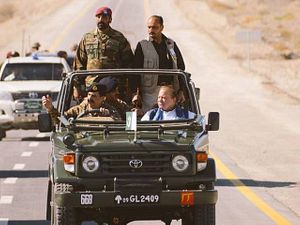“I don’t believe in extension and will retire on the due date,” said the Pakistani incumbent military chief, General Raheel Sharif, in a statement a few months ago, putting to rest rumors circulating in the country about a possible extension of his term as the Chief of Army Staff (COAS). General Sharif’s term is set to end later this year.
On July 6, one media outlet in Pakistan reported that senior United States Senator John McCain, who was then in Pakistan on an official visit, in an exclusive interview, expressed his desire for General Sharif’s extension as the COAS. (The veracity of the interview is unclear; no direct quotes are given.) Though McCain has neither denied nor acknowledged the report, there are reasons to believe that General Sharif’s extension as Pakistan’s COAS can serve U.S. interests better in the region. Three particular motivations stand out in this regard.
First, the General is good for democracy in the country. Since his ascendance to power as the Army Chief, General Sharif has refrained from direct intervention in politics; rather, his role has been instrumental in restraining a number of other generals who were plotting the overthrow of the Pakistan Muslim League-led federal government. While General Sharif has strictly maintained the historic tradition of the military’s dominance over the civilian government, he has repeatedly given assurances of his support for democracy in the country.
While the United States has historically supported military regimes in the country, a direct military government in Pakistan complicates U.S. relations not just with Pakistan, but also with regional states that have always wanted to see “civilian control” of the country. However, the U.S. understands where power and control rest in the country and prefers to deal with the military regarding all strategic matters. At the same time, it wants to see this behind the semblance of a democratic regime in the country.
Second, General Sharif has been a “wartime” general and has brought internal stability by mercilessly going after militants in the country, unlike his predecessor General Ashfaq Parvez Kayani, who was reportedly reluctant to launch a major military operation against the Pakistani Taliban due to fears of a serious backlash.
Generally, instability in Pakistan has been a serious concern for the United States. The security of Pakistan’s nuclear arsenal, which is reportedly one of the “fastest growing nuclear programs” in the world, has often been cast as a serious potential security threat, particularly in case the weapons were to fall into the hands of militants. In the last two years, the insecurity and increasing violence in the country, coupled with Pakistan’s development of “tactical nuclear weapons,” has amplified U.S. worries.
The current COAS’ hard-line approach against militancy in the country has brought violence down by more than 60 percent since 2013. Furthermore, as the Islamic State (IS) rapidly increases its foothold in the region, Pakistan has kept a tight lid on the group and its potential affiliates. General Sharif’s approach of going after militants challenging the state’s writ falls in line with U.S. security interests in the region.
Three, if the incumbent COAS retires on the due date later this year, the current policies being followed by the military might see change, for better or worse. In Pakistan, the COAS enjoys absolute authority over the military and has the ability to change his predecessor’s organizational priorities. All in all, the rules and policies of the military as an organization, to a great extent, are dependent on the Army chief.
Historically, each Pakistani COAS has followed and set his own policies to deal with various domestic and external challenges, with the exception of some traditional policies that have defined the military’s standing and role as an institution in the country (such as dealings with India).
The new military chief may set a different approach to dealing with the internal militancy and civilian government in the country, which could disrupt current policies set by General Sharif. Moreover, on the regional front, General Sharif has also been cooperative, willing, and more receptive to U.S. calls for a change in policy to deal with the regional militancy. This is particularly true for the situation in Afghanistan, despite the fact that it has yielded minimal results.
In this fluid regional security and political context, the United States may not be interested in dealing with a brand new military chief who might detract from the accomplishments of the last two years.
































